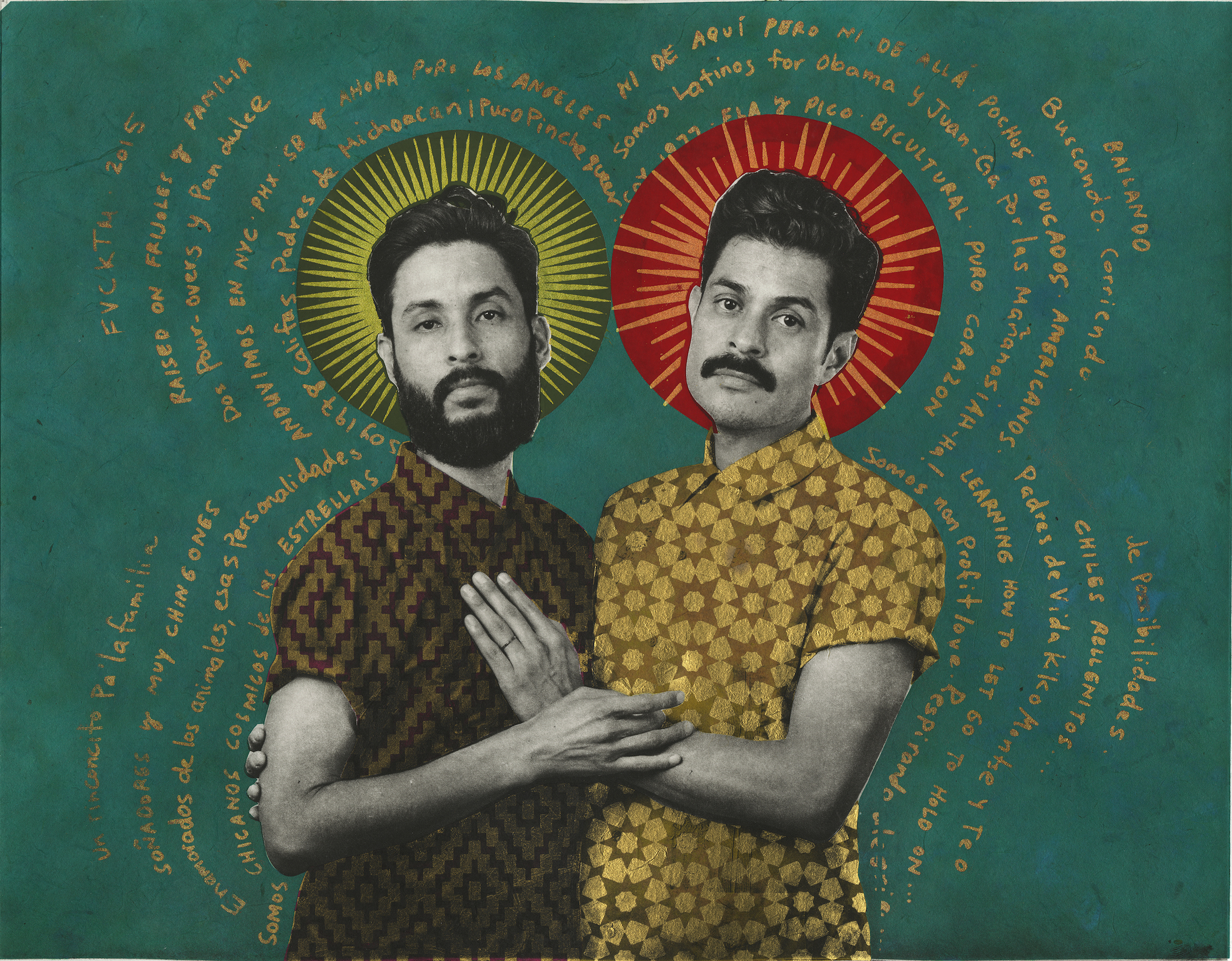Carlos and Fernando Estrada-Lopez are social workers in Los Angeles, but in Gabriel García Román’s Queer Icons, they are a pair of haloed saints locked in an embrace, surrounded by floating messages in mixed Spanish and English that partially read “Raised on frijoles and family,” “Bicultural,” and “Puro Pinche Queer!” (“Pure Fucking Queer”).
Selections from Roman’s Queer Icons photogravure series will join zines, posters, and art books of over 30 Latinx artists and scholars at the inaugural La Feria print media art fair, organized by The Latinx Project at New York University (NYU) this Saturday, September 21.
Arlene Dávila, founding director of The Latinx Project, told Hyperallergic that the one-day event is intended to “help shift the fair ecosystem toward greater accessibility for artists everywhere.” Dávila published a book on Latinx art, markets, and politics in 2020. “Latinx artists are rarely represented in a system dominated by galleries, which are prohibitively expensive and not open to unsolicited artist submissions,” she said, adding that the fair “helps address the gap in opportunities for artists to sell their work.”
The exclusion of Latinos in art spaces runs beyond just New York City art fair season. Latinx curators and artists are still grappling with the legacy of historical marginalization decades after the Smithsonian Institution released a 1994 report acknowledging it had “willfully neglected” Latinos in “almost every aspect of its operations.” More recently, the American Alliance of Museums said Latinos were still “woefully underrepresented in museum collections, exhibitions, staff, and boards.” Organizations like The Latinx Project, founded in 2018, are dedicated to redressing this ongoing inequity.
While this is the first art-specific fair under The Latinx Project name, NYU held an annual Latin American Book Fair in the late 1980s and early ’90s with hundreds of distributors from Spain, Latin America, and the United States.
La Feria’s participating artists were chosen from an open call, drawing photographers, painters, zine makers, small independent presses, and other artists to sell their works without a participation fee. Associate Director of The Latinx Project Gabriel Magraner told Hyperallergic that La Feria’s operating expenses are low due to their utilization of campus space without cost, enabling free public admissions and exposure for artists.
Culture Crush, founded by Debra Scherer, is one of the the presses tabling at the event, representing photography work by South Bronx Puerto Rican photographer Ricky Flores, and Chicano photographer Destiny Mata, who follows the punk scene in New York City.
At another booth, Panamanian-American curandero and visual artist Nicoletta Daríta de la Brown will show their work including one black print reading only “I learned how to love and heal in my abuelita’s kitchen” in all capital white letters.

Aside from art publications and works on paper, the fair will feature dozens of recently published scholarly titles on Latinx culture, history, and politics, with themes including race, border militarization, and queer identity. Among them are Elizabeth Ferrer’s Latinx Photography in the United States: A Visual History (2021), Regina Marie Mills’s Invisibility & Influence: A Literary History of AfroLatinidades (2024), Juana María Rodríguez’s Puta Life: Seeing Latinas, Working Sex (2023), and Michelle Castañeda’s Disappearing Rooms: The Hidden Theaters of Immigration Law (2023).
“This type of book showcase is quite rare outside of an academic conference,” Magraner said, adding that the display will put Latinx scholarship “in conversation with arts and culture.”

